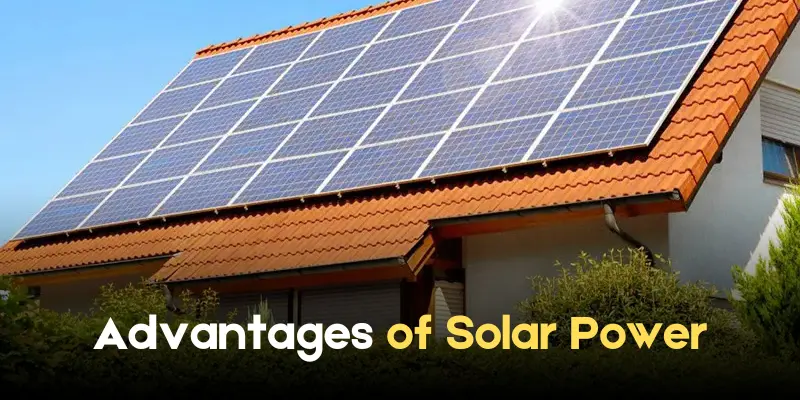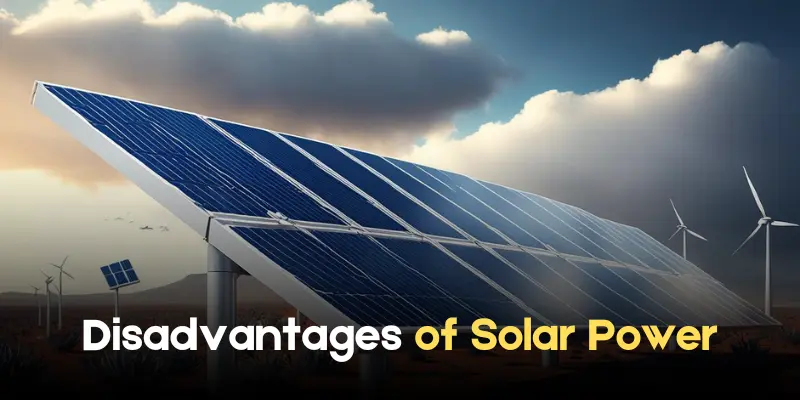The Advantages and Disadvantages of Solar Power You Should Know
Updated: 29 Nov 2024
206
Introduction:
Imagine a world where your electricity comes directly from the sun a free, clean, and endless source of energy. The advantages and disadvantages of solar power aren’t just a passing trend; it’s a revolutionary step toward a brighter, more sustainable future. With the cost of traditional energy sources rising and concerns about the planet growing, solar energy offers a powerful solution for homes, businesses, and communities looking to make a change. But like all things, solar power comes with its own set of advantages and disadvantages
While the benefits of solar energy are clear saving money on bills, reducing your carbon footprint, and using a renewable source there are also challenges to consider. From the initial cost of installation to the space required for panels, solar power isn’t always the right choice for everyone. However, with the right information and planning, these challenges can be overcome, making solar power a smart, long-term investment for those ready to embrace a greener future.
Advantages of Solar Power

Solar power is a clean, renewable energy source that harnesses the sun’s energy to generate electricity. It helps reduce dependence on fossil fuels and lowers environmental impact. As technology advances, solar energy is becoming an increasingly cost-effective solution for homes and businesses alike.
Here are some pros of solar power:
- Reduces electricity bills
- Environmentally friendly
- Renewable energy source
- Low maintenance costs
- Increases property value
- Off-grid energy potential
- Energy independence
- Reduces greenhouse gas emissions
- Creates job opportunities
- Supports energy security
1. Reduces electricity bills
When you install solar panels, they generate electricity for your home or business. This reduces the amount of power you need to buy from the utility company. Over time, the savings on your electricity bills can be significant. In some cases, you may even produce more power than you use, allowing you to sell the excess back to the grid.
2. Environmentally friendly
Solar power is clean and produces no pollution. Unlike fossil fuels, it does not release harmful gases into the air. By using solar energy, you help reduce air pollution and protect the environment. This makes solar power a great choice for those who want to live more sustainably.
3. Renewable energy source
Solar energy comes from the sun, which is a natural, renewable resource. The sun provides energy every day, and we will not run out of it. Unlike coal or oil, solar energy is available for as long as the sun shines. This makes it a reliable and endless source of energy.
4. Low maintenance costs
Solar panels require very little maintenance. After installation, they typically need only occasional cleaning to keep them working well. Since there are no moving parts, there’s less chance of things breaking down. This helps keep maintenance costs low over the long term.
5. Increases property value
Homes with solar panels are often valued higher than those without. Potential buyers see solar power as an attractive feature because it can lower energy bills. This increase in property value can help you sell your home for more money in the future. It’s an investment that pays off both now and later.
6. Off-grid energy potential
Solar panels can work even in remote locations where there is no connection to the electricity grid. This makes them perfect for rural homes, cabins, or places with unreliable power supply. By going off-grid, you can become less dependent on the utility companies and enjoy reliable power anywhere.
7. Energy independence
Solar power allows you to produce your own electricity, which means you’re less reliant on the energy market. You won’t be affected by rising energy prices or power shortages. This independence gives you greater control over your energy use and costs.
8. Reduces greenhouse gas emissions
Unlike burning fossil fuels, solar power does not release carbon dioxide or other greenhouse gases. This helps lower the overall carbon footprint of your energy consumption. By using solar energy, you contribute to the fight against climate change and help make the world cleaner.
9. Creates job opportunities
The solar energy industry has created many jobs in installation, manufacturing, and maintenance. As more people adopt solar power, the demand for these jobs continues to grow. This helps boost local economies and offers employment to skilled workers in a rapidly expanding field.
10. Supports energy security
Solar power helps increase energy security by reducing reliance on imported fossil fuels. By generating power locally, you can protect your home or business from energy disruptions. Solar energy makes your energy supply more secure and less vulnerable to political or economic changes around the world.
Disadvantages of Solar Power

While solar power offers many benefits, it also has some limitations. It may not always be the right solution for every home or business, depending on various factors like location, cost, and weather conditions.
Here are some cons of solar power:
- High initial installation costs
- Weather-dependent
- Requires a lot of space
- Energy storage is expensive
- Production efficiency varies
- Limited power at night
- Installation may not be possible on some roofs
- Aesthetic concerns for some homeowners
- Impact on wildlife and land use
- Not ideal for all geographic locations
1. High initial installation costs
The upfront cost of installing solar panels can be quite expensive. You need to buy the panels, inverters, and other equipment, and then pay for installation. Although prices have dropped over the years, it can still be a large investment for many people. However, government incentives or rebates can help lower these costs in some areas.
2. Weather-dependent
Solar panels rely on sunlight to generate electricity. On cloudy or rainy days, they produce less power. In places with long winters or frequent bad weather, solar energy may not be as reliable. This can limit the effectiveness of solar power in certain climates.
3. Requires a lot of space
To generate enough electricity, solar panels need a lot of space. This can be a problem for people with small roofs or limited land. The more space you have, the more energy you can produce, but not everyone has the room for large installations.
4. Energy storage is expensive
When solar panels produce more energy than you need, the extra power is usually stored in batteries. However, these energy storage systems can be expensive. The cost of batteries can add a significant amount to the total installation cost. Additionally, batteries may need to be replaced after several years of use.
5. Production efficiency varies
Solar power efficiency can depend on several factors, like the angle of the panels, the amount of sunlight, and how clean the panels are. Not all solar panels are equally efficient, meaning some produce more electricity than others. Even the best panels may not work at full capacity all the time due to environmental factors.
6. Limited power at night
Solar panels only generate power during the day when the sun is shining. At night, they don’t produce any electricity unless you have an energy storage system. This means you need to find another power source, like the grid, to cover your energy needs after dark.
7. Installation may not be possible on some roofs
Not all roofs are suitable for solar panel installation. Roofs with shading, poor structural integrity, or unusual shapes may not be able to support panels. Some buildings, especially older ones, may need significant modifications to make solar power work, which can increase costs.
8. Aesthetic concerns for some homeowners
Solar panels can change the look of a building. Some people don’t like the appearance of solar panels on their roof and may feel that they reduce the visual appeal of their home. This can be a barrier for people who prioritize aesthetics or live in areas with strict design regulations.
9. Impact on wildlife and land use
Large-scale solar farms require land to set up thousands of panels. This can disrupt local wildlife habitats or lead to land use conflicts. In some areas, this has raised concerns about the environmental impact of large solar installations on ecosystems.
10.Not ideal for all geographic locations
Solar power works best in places that get plenty of sunlight. In areas with frequent cloud cover, long winters, or low sunlight, solar panels may not generate enough energy. This makes solar power less practical in some regions, especially those located far from the equator.
Conclusion:
So guys, in this article, we’ve covered the advantages and disadvantages of solar power in detail. While solar energy offers numerous benefits, such as reducing electricity bills and protecting the environment, it’s important to consider the upfront cost and space requirements. My personal recommendation is to invest in solar power if you live in a sunny area with enough space for installation. If you’re ready to make the change, start by getting a quote from a local solar provider to see how much you could save!
What is solar power?
Solar power is energy that comes from the sun. Solar panels capture sunlight and turn it into electricity. It’s a clean, renewable energy source that reduces reliance on fossil fuels.
How do solar panels work?
Solar panels have cells that absorb sunlight and convert it into electricity. The electricity generated is either used immediately or stored in batteries for later use. A system of wires then distributes the energy throughout your home.
Is solar power expensive to install?
The initial cost of solar panels can be high, but the prices have dropped significantly over the years. Many government incentives or rebates can help lower the cost. Over time, solar power can save you money on electricity bills.
How much space do I need for solar panels?
The amount of space needed depends on how much electricity you want to generate. A typical home might need 200-300 square feet of roof space. You can also install panels on the ground if your roof isn’t suitable.
Can solar panels work in cloudy weather?
Yes, solar panels still work on cloudy days, but they generate less power than on sunny days. Solar panels capture indirect sunlight, so even on overcast days, they can produce energy, though not as efficiently.
How long do solar panels last?
Solar panels can last over 25 years or more with proper maintenance. The efficiency of panels may decrease slightly over time, but they still generate power for many years. Most panels come with a 20 to 25-year warranty.
Can I use solar power at night?
No, solar panels only produce power during the day when there is sunlight. However, you can store extra energy in batteries for use at night. Alternatively, you can stay connected to the grid for power during nighttime.
Do solar panels require a lot of maintenance?
Solar panels require very little maintenance. You should clean them occasionally to remove dust or debris. It’s also a good idea to have them inspected every few years to ensure they’re working properly.
Are there any environmental benefits to using solar power?
Yes, solar power helps reduce greenhouse gas emissions and air pollution. It’s a clean energy source that doesn’t produce harmful byproducts like burning fossil fuels. By using solar energy, you’re helping protect the environment.
What happens if I generate more solar power than I need?
If your solar panels produce more power than you use, the excess energy can be stored in batteries or sent back to the grid. Some utility companies may pay you for the extra power you send to the grid, which is called net metering. This helps you get credit for the energy you generate.
Please Write Your Comments